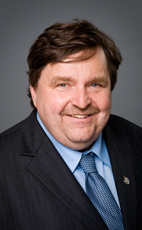Mr. Speaker, I am pleased to rise to support Motion No. 441, which calls on the federal government to give municipalities a tool that will facilitate and expedite the administration of the lakes in their area.
This motion is very important for rural communities throughout Canada, especially those that have many lakes. I counted about fifty lakes in the riding of Brome—Missisquoi alone. In my riding, municipalities face considerable challenges when they try to better manage their waterways. However, municipalities are closer to their citizens and in a better position to act on their behalf. That is why we believe that the process has to be streamlined.
In speaking to stakeholders from various areas, I learned that, in many cases, municipalities simply decided to withdraw from the administrative process. In some cases, the battle lasted for years.
I would like to talk about the situation in Brome—Missisquoi, for example. First of all, I would like to thank the Brome—Missisquoi watershed organizations for their great work over the years. I have learned a lot from them about the situation of the Brome—Missisquoi lakes.
For example, people regularly water-ski or use personal motorized watercraft on Lac Bran de Scie. When they do, the other recreational users have no choice but to leave in order not to be hit by a boat. The lake is small enough that a good swimmer can easily swim across it. However, it would be reckless to try it without being escorted by a boat and someone watching to protect the swimmer. There have even been boat collisions.
In 1987, on Brome Lake, a man drowned when his sailboat was hit by a motorboat. In 1990, on the same lake, a canoe was heavily damaged by a 225-horsepower motorboat whose driver was blinded by the sun. In the summer of 2005, a rowboat equipped with a motor just missed hitting two kayakers.
Motors are increasingly powerful and there are more and more boats on the water every year. On Brome Lake, there are more than 400 motorboats and half of them are equipped with motors of 50 horsepower or more. It is difficult for the authorities to monitor the situation.
The municipality of Orford township area is dotted with a multitude of lakes, and so are the surrounding municipalities. Since some of those lakes are quite large, in terms of surface area, officers obviously have trouble covering the smaller ones. That means that it is almost impossible to apply the current regulations on our lakes given the current legislative framework.
In addition to these safety issues, there are environmental problems. The noise pollution from some kinds of motors disturbs the people who live along the shores. The banks are also eroding because the wake from motor boats creates large waves. A large number of these boats are still driven by two-stroke engines. That particular kind of engine is known to discharge the oil it uses. However, many lakeside cottages get their drinking water from those same lakes. Clearly, using gasoline-powered engines on our lakes can have a negative effect on the health of the residents who use the water for their needs.
Because of this, a number of people are calling for restrictions on certain kinds of gasoline-powered engines or are asking that only electric motors be used in order to reduce the risk of pollution from the discharge of oil.
Banning motor boats on the Chaîne des Lacs in the Orford township has made news on a number of occasions. In June 2006, the municipality of Orford township held public consultations that led to submissions suggesting a ban on motor boats on the Chaîne des Lacs. Following those consultations, in November 2007, the municipal council passed, by majority, a proposal to ban motor boats, except those with battery powered electric motors.
They had to wait until the winter of 2009 before Transport Canada finally replied, turning them down. Instead, Transport Canada required compliance with the regulations in effect. This put an end to the initiative of the municipality and the local association, despite the general movement of support from the people.
The process in place under these current regulations may cost hundreds of thousands of dollars in the smallest municipalities, which simply do not have that kind of money. The process can be drawn out over several years, as it did in the example I gave. For a municipality of 1,500 people, starting a process that goes on for years needs legal counsel, which can be very expensive.
Under the current regulations, if the vast majority of people who live by a lake agree to impose a restriction, a single person can disobey the order and ride his 300-horsepower motorboat on a lake no bigger than Parliament Hill, for example.
Motion No. 441 presents us with the opportunity to work in a non-partisan way on this issue. As my colleague so aptly said, this motion is designed to reduce red tape, and it will cost nothing. If our friends opposite would like to vote in favour of the motion, I invite them to do so.
We believe that municipalities know the people and are well positioned to ensure social peace. In my many discussions with various stakeholders, three main aspects came up over and over again: social peace through better municipal control, greater environmental protection and less red tape.
Keep in mind that in 2008, the summary of the regulatory impact analysis stated that the increase in waterway activity led to an increase in disputes between waterway users. Many municipalities reacted by asking for restrictions on navigation.
It is our duty to respond to their request by supporting this motion. Already, more than 40 municipalities have each indicated their support for this motion. I invite the members of the House to do the same.

